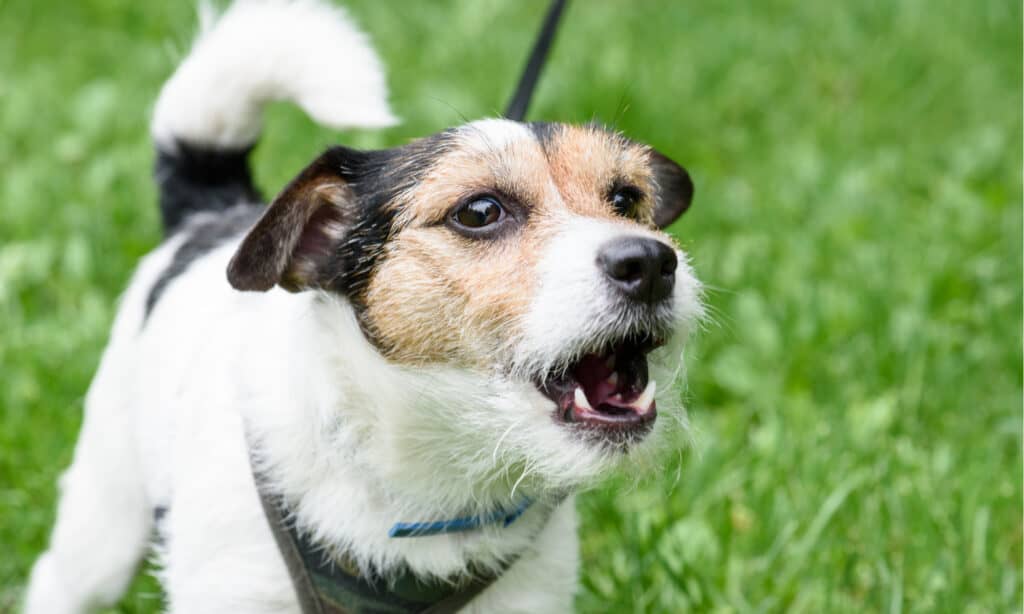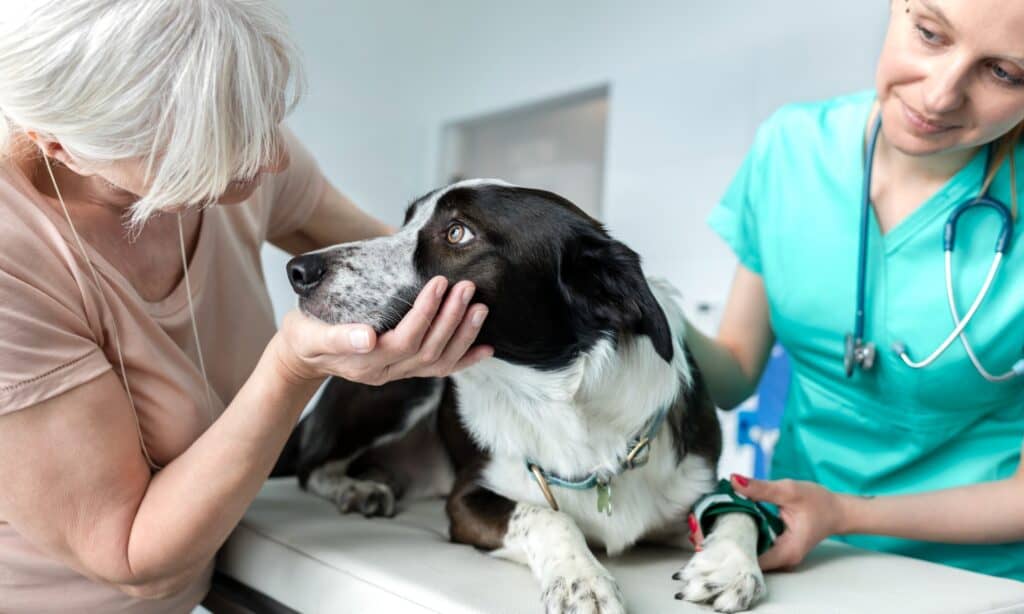Many of us know what it is like to lose our voice due to some form of throat irritation. Whether it’s due to a current cold or singing your heart out at a concert, losing your normal speaking voice is a strange feeling.
Our dogs may not speak the same way that you and I do, but they still have a voice that they use to communicate with the world around them. So, since our canine companions talk in their own way, does this mean dogs can also lose their voice? The answer to this question is yes, dogs can lose their voice, but there are a few important factors to be aware of when it comes to voice loss in dogs!
To make sure you understand the potential cause(s) of your dog’s sudden voice loss, let’s dive into the underlying causes that can be to blame below.
Understanding a Dog’s Bark

Dogs use barking to communicate to the world around them.
©alexei_tm/Shutterstock.com
Before we dive into the details of voice loss in dogs, we should first begin by discussing the details of a dog’s bark. Just like you, our dogs have a voice box at the back of their throat that is also known as the larynx. The larynx is not a single structure in itself, but it is made up of multiple tissues and muscles that come together to form the voice box. The larynx is not only responsible for producing sound, but it also prevents food and water from entering the dog’s airways.
Similar to how the voice box works in humans, a dog’s larynx will create sound through vibrations of the structure. The dog will pull air in and out of the mouth while barking, and as the vocal cords open and close, the dog creates the barking sound. Each muscle and collection of tissue plays a role in how the dog’s voice is created, as well as protecting the airways from unwelcomed food and debris.
Can Dogs Lose Their Voice? 5 Causes of Voice Loss in Dogs
Now that you are aware of how a dog creates their barking sound, we can dive into the list of potential causes of voice loss in dogs. Each of the causes we will discuss below can impact the dog’s larynx and ability to create sound, so let’s break them down in detail so you can understand your dog’s symptoms.
1. Overusing Their Vocal Cords
If you have ever lost your voice after a night of singing or having to speak loudly, then you know what it is like to overuse your vocal cords. Our dogs can put a strain on their voice box just like you and I can, especially if they have been barking for extended periods for any reason. This is really common in dogs that have separation anxiety and will bark for hours when they are left alone, dogs that are barking excessively during stressful events like storms or fireworks, and even dogs that experience excessive barking due to cognitive dysfunction. If your canine friend is barking excessively for any reason, this could cause them to lose their voice.
2. Respiratory Illness Symptoms
Have you ever experienced a cold so severe that your voice sounds hoarse and weak? Our dogs can experience this complication as well when they catch a respiratory illness! Respiratory illnesses of any kind can lead to inflammation of the nasal passages and throat, which can in turn impact how the voice box functions. If any of the tissues that make up the larynx become inflamed, this can impact the way the structure vibrates, ultimately putting a strain on the dog’s bark. This can cause everything from a hoarse bark to complete voice loss based on how severe the tissue inflammation is.
3. Collapsing Trachea
Another potential cause of voice loss in dogs is a condition known as tracheal collapse. This condition has the ability to deeply impact a dog’s quality of life. It can affect everything from their voice to their ability to breathe.
The trachea is the tube that connects the dog’s throat to their lungs. It functions as the passageway for air to flow from the mouth and nose and into the dog’s lungs, so they rely on the trachea with every breath they take. The trachea itself needs to maintain a tube-like shape to allow air to flow naturally, and this is achieved by the many cartilage rings that make up the structure. Without the cartilage rings in the trachea, 80% of the passageway would not be able to hold its shape.
When a dog develops a collapsing trachea, this means that the rings of cartilage in the trachea have begun to weaken over time. This weakening process can range in severity, but it will ultimately make it difficult for the trachea to maintain its tube-like passage. This makes it challenging for a dog to pass air into their lungs, as the trachea will begin to collapse a bit with each inward breath they take.
If a dog is struggling with a collapsing trachea, they often develop a hoarse bark or honking cough. These pups may also struggle with stamina upon physical exertion, and they may even fall into respiratory distress in severe cases. Any canine companion can develop tracheal collapse, but it is most common in small-breed dogs or those with cardiac conditions. While some dogs will have a mild tracheal collapse that doesn’t require treatment, others will need to be managed by their vet throughout their lives.

A dog in this position may be experiencing breathing troubles while sleeping.
©Patryk Kosmider/Shutterstock.com
4. Laryngeal Paralysis
While a collapsing trachea is due to the cartilage rings in the trachea losing their turgidity over time, laryngeal paralysis is a result of the improper function of the nerves within the larynx. The larynx is the structure that is responsible for generating a dog’s voice. So, you can imagine how a failure of the nerves within this structure can impact the dog’s bark. Not only can the dog struggle with a hoarse bark or complete voice loss because of this, but they can also have a hard time blocking food and water from entering the airway.
There are two main forms of laryngeal paralysis (LARPAR) in dogs, with one being a congenital issue and one developing in the dog’s senior years. No matter which form of LARPAR your dog suffers from, it has the ability to deeply impact their life. Many dogs with LARPAR will suffer from voice loss, excessive panting, coughing when eating or drinking, decreased stamina, weakness of the limbs, and even secondary pneumonia due to aspirating their food or water. Dogs with laryngeal paralysis will typically require ongoing care for the rest of their lives.
5. Throat Injuries or Blockages
And last, throat injuries or any form of blockage in the throat can lead to voice loss in dogs. This will usually cause your dog to have a sudden change in their voice, with many pups behaving erratically as if something in their throat is bothering them. A dog with a throat injury or throat blockage may cough, act as if they are trying to hack something up, paw at their face, pant excessively, and may even have a hard time breathing. If you notice any of these symptoms in your dog, we suggest taking a look in their mouth and trying to examine their throat. If you cannot see anything from home but your dog appears distressed, we suggest rushing them to your nearest vet for an exam.
When to See the Vet for Voice Loss in Dogs

It’s important to keep a close eye on your dog anytime you notice a change in their voice.
©iStock.com/IPGGutenbergUKLtd
So when should you reach out to your vet when your dog has lost their voice? While we always suggest giving your vet a call and keeping them informed about your pet’s care, we can offer some specific guidance on when a vet visit is a must.
From the moment you notice the change in your dog’s voice, we suggest keeping a close eye on them in the days and weeks that follow. If their voice loss resolves within 24-48 hours and they are not experiencing any other strange symptoms, then it is possible that they were struggling with a mild throat irritation.
However, if your dog’s voice loss lasts for more than 48 hours, or if they are experiencing any other respiratory symptoms along with their voice change, we suggest reaching out to your vet for guidance. This is especially true if you think they might be experiencing any difficulty with breathing, and you should reach out to a veterinarian immediately if you think this is the case.
Final Thoughts
Anytime a dog suddenly loses their voice, it is typically a result of some form of irritation to the larynx or the trachea. We suggest keeping a close eye on your pup from the moment you notice their voice change, and to reach out to your vet if they are experiencing any other respiratory symptoms.
Up Next:
- 6 Reasons Why Your Dog Keeps Coughing
- What Is Kennel Cough: The 6 Ways Dogs Get It, Signs and Symptoms, and How to Treat It
- 9 Reasons Your Dog is Retching (Dry Heaving) And What to Do About It
The photo featured at the top of this post is © Annette Shaff/Shutterstock.com
Ready to discover the top 10 cutest dog breeds in the entire world?
How about the fastest dogs, the largest dogs and those that are -- quite frankly -- just the kindest dogs on the planet? Each day, AZ Animals sends out lists just like this to our thousands of email subscribers. And the best part? It's FREE. Join today by entering your email below.
Sources
- VCA Animal Hospitals, Available here: https://vcahospitals.com/know-your-pet/laryngeal-paralysis-in-dogs
- VCA Animal Hospitals, Available here: https://vcahospitals.com/know-your-pet/tracheal-collapse-in-dogs
Thank you for reading! Have some feedback for us? Contact the AZ Animals editorial team.






